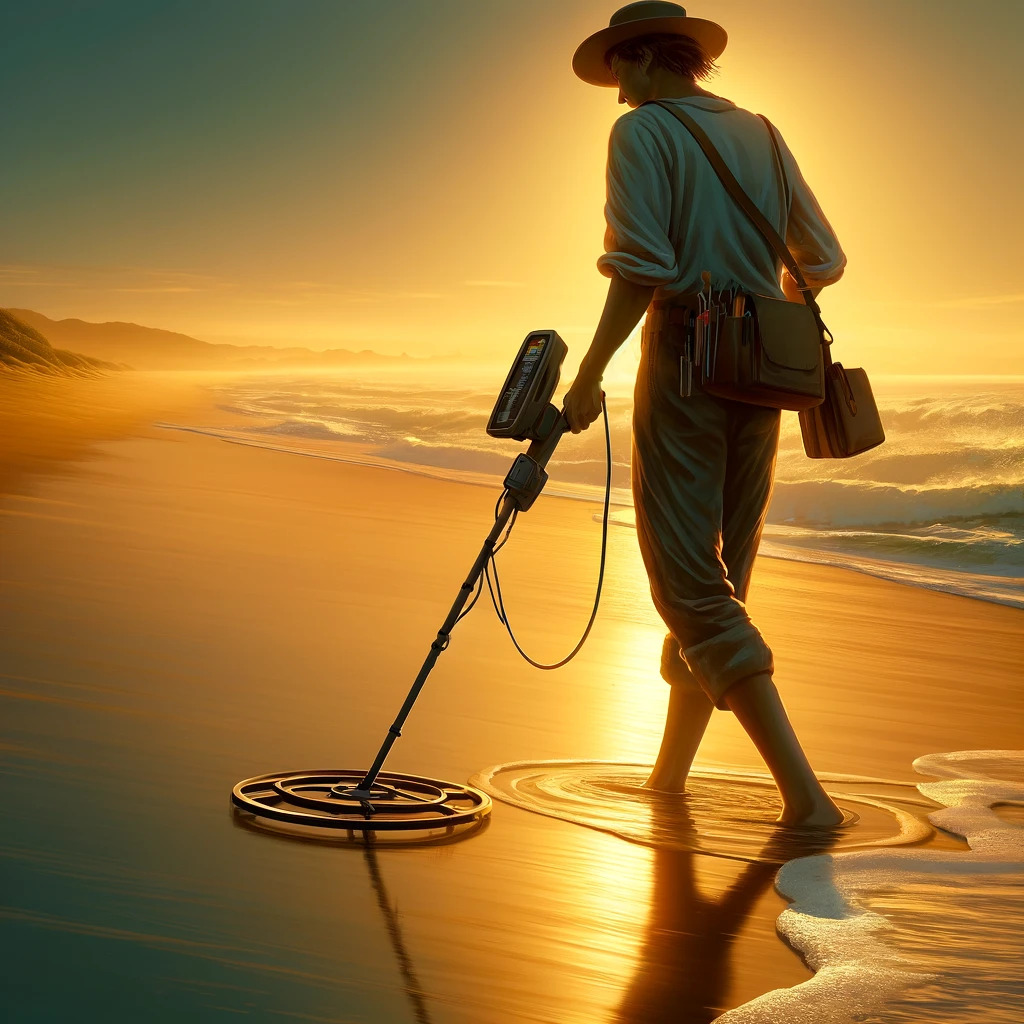Embark on a journey of discovery and adventure with beach metal detecting, a hobby that combines the thrill of exploration with the serenity of beachside nature. It’s not merely about the hunt for lost treasures; it’s about connecting with history, embracing the outdoors, and enjoying a rewarding pursuit that offers surprises at every turn. From ancient coins whispering tales of yesteryears to modern jewelry lost in moments of carelessness, the beach is a vast canvas awaiting your exploration. With the right tools, such as the best beach metal detector and a sturdy beach sand scoop for metal detecting, you’re set to embark on this rewarding adventure.

Equipping Yourself for Success: Selecting the Perfect Metal Detector
When choosing the best metal detector for the beach the first thing you need to know is that it has to be waterproof or water-resistant features and that is non-negotiable. They will allow you to explore the shallow waters where many treasures hide.
- Very Low Frequency (VLF). Suitable for beginners, offers a balance between cost and functionality for dry sand hunts.
- Pulse Induction (PI). PI detectors excel in wet sand and underwater due to their deeper penetration and immunity to mineralization, making them an ideal choice for the best beach metal detectors
Timing Your Hunt: Navigating Tides and Seasons for Optimal Finds
Understanding the best times to go beach metal detecting can significantly increase your chances of success.
- Low tide is the beachcomber’s ally, revealing areas of the beach that hold potential treasures carried by the waves.
- After storms or during the off-season, when fewer people frequent the beaches, are also prime times for metal detecting.
During these times, the sea might relinquish treasures from its depths, offering unique finds ranging from historical artifacts to recent valuables lost by tourists.
Mastering the Technique: The Art of the Search
Effective metal detecting is more than a leisurely stroll along the beach; it’s a skill honed with patience and practice
- Developing a systematic sweeping pattern ensures no spot is missed, much like mowing a lawn.
- The right digging technique, using tools like the metal detecting beach shovel, is crucial to retrieve targets without damaging them or disrupting the beach environment.
- Learning to interpret the detector’s signals — distinguishing between the false alarms caused by mineralization and the promising beep of a valuable item — can save time and effort.
“Listen not just for the tone, but for the story it tells. A faint, deep signal might lead you to a relic buried far beneath the surface, while a strong, shallow beep could signify a recent loss.”
The Ethical Treasure Hunter: Respecting the Beach and Its History
Metal detecting on the beach is not just about what you find; it’s about how you conduct your search. Adhering to local laws and regulations, respecting wildlife and natural habitats, and practicing the ‘Leave No Trace’ principle are paramount. Filling in holes, removing any trash found, and being mindful of others enjoying the beach contribute to a positive image of the metal detecting community.
Joining the Community: Sharing Stories and Tips
The metal detecting community is a vibrant network of enthusiasts eager to share their knowledge, experiences, and finds. Engaging with this community through online forums, local clubs, and social media can provide invaluable tips, like the best metal detector for salt water beach hunts or recommendations for the best waterproof metal detector for beach reviews. Sharing your own stories and discoveries, such as your best beach metal detecting finds or advice on the best place to metal detect on the beach, enriches the hobby for everyone.
Q&A on Beach Metal Detecting
- What do I need to start beach metal detecting?
- To start, you need a waterproof or water-resistant metal detector suitable for beach conditions, a durable beach scoop or shovel for digging, headphones to hear the detector signals clearly, and a finds pouch or container for your treasures.
- Is beach metal detecting allowed everywhere?
- Beach metal detecting rules vary by location. Some beaches allow it without restrictions, while others require permits or restrict detecting to certain areas or times. Always check local regulations before you start.
- How do I improve my chances of finding something good?
- Improve your chances by researching and targeting areas with high foot traffic, learning to interpret your detector’s signals accurately, detecting after storms or during low tide, and practicing your sweeping and digging techniques.
- How do I take care of my finds?
- Care for your finds by gently cleaning them with water. For delicate or potentially valuable items, consider consulting a professional conservator to avoid damage.
- Can I find valuable items while metal detecting on the beach?
- Yes, beaches can be rich with finds, from modern jewelry and coins lost by beachgoers to historical artifacts washed ashore. The value of finds can range from the sentimental to the financially significant.
- How can I be an ethical beach metal detectorist?
- Practice ‘Leave No Trace’ principles by filling in holes and removing trash, adhere to local laws, respect wildlife and natural habitats, and consider returning items that might hold personal value to their owners.
- What should I do if I find something historically significant?
- If you suspect an item has historical significance, report it to local authorities or a historical society. Handling such finds appropriately ensures they can be studied and preserved for future generations.
- Can beach metal detecting be a family activity?
- Absolutely! Beach metal detecting is a fantastic family activity that combines outdoor adventure with the excitement of discovery. It’s an engaging way to teach children about history, patience, and environmental stewardship.
Leave a Reply